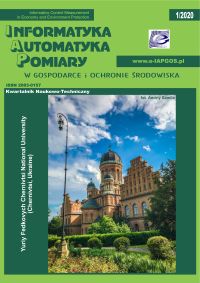THE INCREASE OF THE ENERGY EFFICIENCY OF THE RADIO EQUIPMENT BASED ON THE USE OF MODULATION BY ORTHOGONAL HARMONIC CARRIERS
Article Sidebar
Issue Vol. 10 No. 1 (2020)
-
APPLICATION OF HURST INDICATOR TO CHOOSE AN ALGORITHM FOR RESOURCE CONTROL OF A TELECOMMUNICATION NETWORK
Anton Vrublevskiy, Ivan Lesovoy, Gennadij Pylypenko4-7
-
BLOCK CIPHERS ON THE BASIS OF REVERSIBLE CELLULAR AUTOMATA
Yuliya Tanasyuk, Petro Burdeinyi8-11
-
TIME INTERVAL SWITCHING DEVICE
Ruslan Politanskyi, Andrij Veryga12-15
-
ENVIRONMENT OF ELECTROMAGNETIC COMPATIBILITY OF RADIO-ELECTRONIC COMMUNICATION MEANS
Heorhii Rozorinov, Oleksandr Hres, Volodymyr Rusyn, Petro Shpatar16-19
-
THE GENERATING RANDOM SEQUENCES WITH THE INCREASED CRYPTOGRAPHIC STRENGTH
Volodymyr Korchynskyi, Vitalii Kildishev, Oleksandr Riabukha, Oleksandr Berdnikov20-23
-
THE INCREASE OF THE ENERGY EFFICIENCY OF THE RADIO EQUIPMENT BASED ON THE USE OF MODULATION BY ORTHOGONAL HARMONIC CARRIERS
Sergey Toliupa, Vladimir Nakonechnyi, Alexander Trush24-27
-
SYNTHESIS OF SAFE BEHAVIOR ALGORITHMS OF RADIOELECTRONIC SYSTEMS FOR CRITICAL APPLICATIONS
Leonid Ozirkovskyy, Bohdan Volochiy, Mykhailo Zmysnyi, Oleksandr Shkiliuk28-31
-
METHOD FOR ASSESSING THE STRUCTURAL RELIABILITY OF NETWORKS WITH UNDETERMINED TOPOLOGY
Nina Kniazieva, Alexey Nenov, Irina Kolumba32-35
-
PHOTODIODE BASED ON THE EPITAXIAL PHOSPHIDE GALLIUM WITH INCREASED SENSITIVITY AT A WAVELENGTH OF 254 nm
Yurii Dobrovolsky, Volodymyr M. Lipka, Volodymyr V. Strebezhev, Yurii O. Sorokatyi, Mykola O. Sorokatyi, Olga P. Andreeva36-39
-
DETERMINATION OF THE STRUCTURAL STATE AND STABILITY OF THE LASER CRYSTALLIZED Cd1-xМnxTe CRYSTAL SURFACE
Victor Strebezhev, Ivan Yuriychuk, Petro Fochuk, Sergiy Nichyi, Yuriy Dobrovolsky, Victoria Tkachuk, Mykola Sorokatyi, Yurii Sorokatyi40-43
-
TECHNOLOGY AND MEASUREMENTS OF MAGNETORESISTANCE IN THIN-LAYERED FERROMAGNETIC STRUCTURES
Jakub Kisała, Karolina Czarnacka, Mateusz Gęca, Andrzej Kociubiński44-47
-
STUDYING THE PROPERTIES OF PIXELS PERMUTATIONS BASED ON DISCRETIZED STANDARD MAP
Serhii Haliuk, Oleh Krulikovskyi, Vitalii Vlasenko48-51
-
FACE RECOGNITION TECHNIQUES
Olexandr N. Romanyuk, Sergey I. Vyatkin, Sergii V. Pavlov, Pavlo I. Mykhaylov, Roman Y. Chekhmestruk, Ivan V. Perun52-57
-
INVESTIGATION OF THE KOLMOGOROV-WIENER FILTER FOR CONTINUOUS FRACTAL PROCESSES ON THE BASIS OF THE CHEBYSHEV POLYNOMIALS OF THE FIRST KIND
Vyacheslav Gorev, Alexander Gusev, Valerii Korniienko58-61
-
MODELLING OF SPINTRONIC DEVICES FOR APPLICATION IN RANDOM ACCESS MEMORY
Ruslan Politanskyi, Maria Vistak, Andriy Veryga, Tetyana Ruda62-65
-
HARDWARE AND SOFTWARE MEANS FOR ELECTRONIC COMPONENTS AND SENSORS RESEARCH
Gryhoriy Barylo, Oksana Boyko, Ihor Gelzynskyy, Roman Holyaka, Zenon Hotra, Tetyana Marusenkova, Mykola Khilchuk, Magdalena Michalska66-71
-
WAYS TO PRODUCE RENEWABLE ENERGY FROM CARBON DIOXIDE
Natalia Grigorieva, Viktor Shabaykovich, Larysa Gumeniuk, Pavlo Humeniuk, Lubov Dobrovolska, Dmitry Sobchuk72-76
-
SATURATION OF THE ABSORPTION OF THERMAL RADIATION BY ATMOSPHERIC CARBON DIOXIDE
Jan Kubicki, Krzysztof Kopczyński, Jarosław Młyńczak77-81
-
CLASSIFICATION OF MULTIDIMENSIONAL POLARIZATION MICROSCOPY RESULTS IN THE TECHNOLOGY OF FORENSIC INTELLECTUAL MONITORING OF HEART DISEASES
Oleg Vanchulyak, Serhii Golub, Mariia Talakh, Vyacheslav Gantyuk82-86
Archives
-
Vol. 12 No. 4
2022-12-30 16
-
Vol. 12 No. 3
2022-09-30 15
-
Vol. 12 No. 2
2022-06-30 16
-
Vol. 12 No. 1
2022-03-31 9
-
Vol. 11 No. 4
2021-12-20 15
-
Vol. 11 No. 3
2021-09-30 10
-
Vol. 11 No. 2
2021-06-30 11
-
Vol. 11 No. 1
2021-03-31 14
-
Vol. 10 No. 4
2020-12-20 16
-
Vol. 10 No. 3
2020-09-30 22
-
Vol. 10 No. 2
2020-06-30 16
-
Vol. 10 No. 1
2020-03-30 19
-
Vol. 9 No. 4
2019-12-16 20
-
Vol. 9 No. 3
2019-09-26 20
-
Vol. 9 No. 2
2019-06-21 16
-
Vol. 9 No. 1
2019-03-03 13
-
Vol. 8 No. 4
2018-12-16 16
-
Vol. 8 No. 3
2018-09-25 16
-
Vol. 8 No. 2
2018-05-30 18
-
Vol. 8 No. 1
2018-02-28 18
Main Article Content
DOI
Authors
Abstract
Most of the theoretical results, as well as methods using OFDM modulation, are obtained in order to increase the rate of information transmission with energy constraints and the bandwidth. For broadband radio access systems, this task is primarily due to the commercial purpose of these systems and the desire of the communications developers to provide high-speed wireless access to the Internet as much as possible at the same time. This article is devoted to the issue of increasing the energy efficiency of radio equipment using modulation orthogonal harmonic carriers under conditions of intentional interference and frequency-selective fading while ensuring a given level of reliability and speed of information transmission.
Keywords:
References
Coleri S., Ergen M., Puri A., Bahai A. : Channel estimation techniques based on pilot arrangement in OFDM systems. IEEE Trans. Broadcast 48(3)/2002, 223–229. DOI: https://doi.org/10.1109/TBC.2002.804034
Morelli M.: A Comparison of Pilot-Aided Channel Estimation Methods for OFDM Systems. IEEE Trans. on Signal Processing 49(12)/2001, 3065–3073. DOI: https://doi.org/10.1109/78.969514
Kuvshinov O. V.: OFDM technology: an overview of problems and ways of solving them. Communication 1/2008, 42–46.40.
Pickholtz R. L.: Theory of Spread-Spectrum Communications. IEEE Trans. Commun. Com-30(5)/1982, 855–884. DOI: https://doi.org/10.1109/TCOM.1982.1095533
Edfors O., SandellM., van de Beek J. J. et al.: OFDM channel estimation by singular value decomposition. IEEE Trans. Commun. 46(7)/1998, 931–939. DOI: https://doi.org/10.1109/26.701321
Li Y.: Robust channel estimation for OFDM systems with rapid dispersive fading channels. IEEE Trans. Commun. 46/1998, 902–915. DOI: https://doi.org/10.1109/26.701317
Toliupa S., Gursky T. G., Voskolovich A. I.: An analysis of the method of evaluating the parameters of the channel’s channels in the link. News of the Sovereign to the University of Information Technology 9(3)/2011, 194–204.
Toliupa S., Babenko T., Parhomenko I.: The method of forming and signal processing aimed at improving stealth and energy efficiency. 2nd International Conference Advanced Information and Communication Technologies (AICT), 2017, 304–308. DOI: https://doi.org/10.1109/AIACT.2017.8020125
Gursky T.G.: Mathematical model of radio line using OFDM technology in the conditions of influence of intentional interference. Proceedings of VITI NTU "KPI" 2/2008, 9–16.
Article Details
Abstract views: 529
License

This work is licensed under a Creative Commons Attribution-ShareAlike 4.0 International License.






